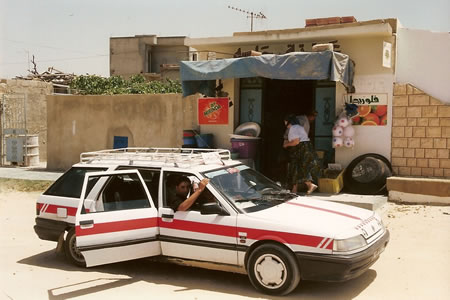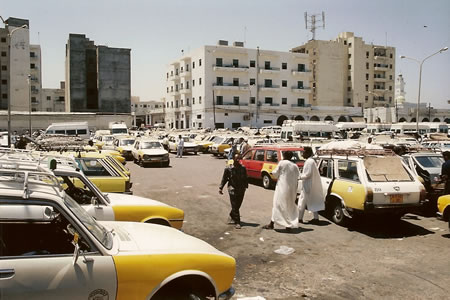English | Dutch |
|
| With the Venga Boys to Libya | |
Tripoli (Libya), June 29th 1999 |
|
Officially, Libya’s name is ‘the Great Socialist People's Libyan Arab Jamahiriya’, or in other words: the state of the mass. Libya pretends to be the most socialistic and democratic country of the world, with all authority at the people. Libya even has developed a theory for this that is fully described in the so-called ‘green book’. The person behind this theory is the person that really has all decision power in Libya: Colonel Mua’mar Gadaffi, leader of the military dictatorship.
It is 1999 and we decided to make a journey to Libya. Many people tell us that we must be mad to go to this country that has a very bad image at the majority of the people. Besides that, Libya still suffers from the embargo of the United Nations because of their role in the Pan Am airline bombing. The embargo makes it very difficult to bring a visit to Libya. There are no direct flights and it is also very difficult to get a visa. Via a ‘man in the middle’, which we found through the internet, we were able to get a visa. Our plan is to travel to Tunisia first and cross form there the border to Libya. It is 07.00 in the morning and we are on the louage station of the Tunisian city Sfax. A louage is a shared taxi that is often used in North Africa to travel between cities. It is the faster and slightly more expensive alternative to a bus. The louage leaves for its destination as soon as 7 passengers are available. Besides the driver, 1 person in the front, 3 persons in the middle row and 3 people in the back. At 10.30, Adnecerim (the driver) decides that the louage has enough passengers to start with the journey to Tripoli in Libya. That is strange because only 5 persons are present, Adnecerim the driver, Ali, Wisem, and the two of us. But ok, let’s hit the road. Wisem is a Tunisian soccer player who is good enough to play in the Tunisian youth team. He earns his money playing for a second division Libyan soccer team. His biggest wish, as for most other Tunisian young guys, is to live in Europe. He tells us that there are two options to go to Europe. The first option is to become a good soccer player, and the second option is to marry a female European tourist. The second option seems to be the easy one. All female tourists to Tunisia are warned. Ali is an older man who is not looking for these kinds of challenges. He has a family in Tunisia that he wants to support as good as possible. For that reason he goes to Libya a couple of months per year to earn some extra money. Libya is famous for the fact that it uses a lot of foreign labor capacity to do the real work in the country. Especially people from neighboring countries travel several months per year to Libya to take advantage of the higher salaries. |
|
 |
|
Preparing ourselves in Tunisia for the trip to Libya |
|
| The first part of the journey goes prosperous. However, at the Tunisian city of Gabès things are changing. Adnecerim stops the louage at a small shopping center. Together with Wisem he leaves the car and disappears in the mass of the shopping center. They are back thirty minutes later with approximately 100 audiocassettes. We don’t like this delay because we think we will need our time at the border crossing. And besides that, we want to arrive as early as possible in Tripoli to find a nice hotel room. Adnecerim and Wisem bought also 10 bottles of cold water and an equal number of newspapers. Different countries have different habits is what we think. After a total delay of 1 hour, we continue with our journey to Tripoli. The color of the landscape changes more and more from green to yellow. We are entering the desert. In the last village before the Libyan border we make a short stop to change our dollars for Libyan Dinars. The reason is that the exchange rate in Tunisia is four times higher than in Libya itself. Libya tries to keep the value of its currency as high as possible. It is forbidden to bring Dinars into the country. For that reason we hide the Dinars under our clothes and even in our shoes. Our fellow passengers warn us for the detailed search at the border and tell us that we loose all the Dinars if they will find them. We have no choice because Libya is too expensive for us if we have to pay the ‘official’ exchange rate in Libya. In the same village, Adnecerim stops at a garage and ask an employee to remove the inner tube of his spare tire. Again, my travel mate and me look at each other and ask us what the hell is going on? It must be an example of the typical culture shock.
Without an inner tube, but with 100 audiocassettes, 10 bottles of cold water, an equal number of newspapers and a load of illegal money, we make the final stretch to the Libyan border. A couple of kilometers before the border, we stop again. I must confess that some level of irritation is coming up now. We are surprised to see that Adnecerim and Wisem take the spare tire out of the car and start filling it with the audiocassettes. The audiocassettes contain music of all kind of western artists, from Metallica and Mariah Carey to the Venga Boys. Because western music is forbidden in Libya, it seems to be a profitable business to bring this music illegally into Libya. It gives us some kind of a good feeling that we are not the only smugglers in this car. | |
 |
|
Finally arriving at the louage station in Tripoli |
|
| The car is starts moving again in the direction of Tripoli. Less than a kilometer further, in some kind of no-man’s-land, we are forced to stop at a Tunisian military checkpoint. At this moment we understand the value of a bottle of cold water and a newspaper. Adnecerim opens his window and hands over some bottles and newspapers to the soldier. Thanks to these presents we are not searched and can continue with our trip to the Libyan border, while other cars are stopped for a detailed search. Also the check at the border goes quite good. The total process takes approximately one and a half hour, including the handing out of the water and newspapers, and a detailed search of our backpacks. We are not frisked; so all the Libyan Dinars enter the country safely. Also the car avoids a detailed check, which means that also Mariah Carey survives this ‘battle at the border’. Our journey really begins. | |